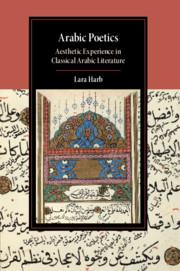Book contents
- Arabic Poetics
- Cambridge Studies in Islamic Civilization
- Arabic Poetics
- Copyright page
- Dedication
- Contents
- Preface
- Acknowledgments
- Note on Dates, Translations, Transliterations, and Names
- Introduction
- 1 Wonder
- 2 Wonder in Aristotelian Arabic Poetics
- 3 Discovery in Bayān
- 4 Metaphor and the Aesthetics of the Sign
- 5 Naẓm, Wonder, and the Inimitability of the Quran
- Epilogue
- Conclusion
- Bibliography
- Index
- Other Titles in the Series
1 - Wonder
A New Paradigm
Published online by Cambridge University Press: 24 April 2020
- Arabic Poetics
- Cambridge Studies in Islamic Civilization
- Arabic Poetics
- Copyright page
- Dedication
- Contents
- Preface
- Acknowledgments
- Note on Dates, Translations, Transliterations, and Names
- Introduction
- 1 Wonder
- 2 Wonder in Aristotelian Arabic Poetics
- 3 Discovery in Bayān
- 4 Metaphor and the Aesthetics of the Sign
- 5 Naẓm, Wonder, and the Inimitability of the Quran
- Epilogue
- Conclusion
- Bibliography
- Index
- Other Titles in the Series
Summary
Chapter 1 addresses the debate about the stylistics of the new (muḥdath) Abbasid poets, with a particular focus on rhetorical figures (badīʿ). It establishes that there was a shift in paradigm from an old school of criticism (ninth–eleventh century), which based its evaluation of poetry on its truthfulness and naturalness (qualities associated with the idealized “classical style” of the pre-Islamic poets), to a new school of criticism (eleventh century onwards) based on an aesthetic of wonder. This new school, represented first and foremost by ʿAbd al-Qāhir al-Jurjānī (d. 1078), articulated the beauty of the kinds of rhetorical figures (badīʿ) that the muḥdath poets relished, especially hyperbolic and fantastic make-believe imagery, by adducing their ability to evoke wonder in the listener. By doing so, they shifted their judgment of poetry from a truth-based scale, to one that is based on an experience of wonder, which results from novelty, strangeness, and the unexpected that can exist in the poetic form regardless of the truth or falsehood of its content. The chapter argues that an aesthetic of wonder is inherent in the very structure of many of the rhetorical figures, including those identified by critics beyond al-Jurjānī, namely, al-Sakkākī, and al-Khaṭīb al-Qazwīnī.
Keywords
- Type
- Chapter
- Information
- Arabic PoeticsAesthetic Experience in Classical Arabic Literature, pp. 25 - 74Publisher: Cambridge University PressPrint publication year: 2020

